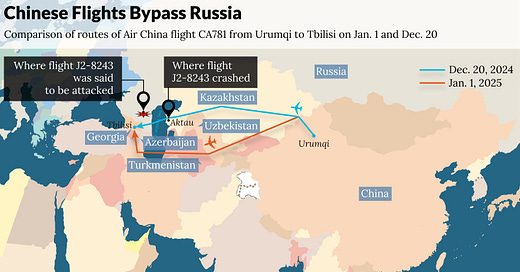Free to Read: Chinese Airlines Skirt Southern Russia After Azerbaijan Plane Crash
Carriers including Air China and China Southern have rerouted flights to avoid the region
Some Chinese airlines are rerouting flights to avoid Russia’s southern airspace after an Azerbaijani passenger plane was shot down, reportedly by the Russian military, in the region on Christmas Day.
Azerbaijan Airlines flight J2-8243, en route from Baku to Grozny, the capital city of southern Russian republic of Chechnya, crash-landed near Aktau in Kazakhstan after diverting from southern Russia, where Moscow has repeatedly used air defense systems against Ukrainian drone strikes. Thirty-eight of the 67 people on board died in the crash.
Azerbaijan’s President Ilham Aliyev said Sunday that the aircraft was “shot down by accident” by Russian air defense systems. The plane had come under some sort of electrical jamming and was shot at while approaching Grozny, he said.
Flight tracking data shows multiple Chinese carriers have since rerouted flights to skirt the region.
On Thursday morning, Air China flight CA781 flew from Urumqi in Northwest China to Tbilisi, Georgia via Kazakhstan, Uzbekistan, Turkmenistan and Azerbaijan, completely bypassing Russian airspace, according to flight tracking data. Before the Dec. 25 crash, the flight would normally enter Georgia via southern Russia’s Dagestan, without passing through Azerbaijan.
China Southern Airlines has rerouted multiple flights. On Monday, flight CZ6039 from Urumqi to Georgia took a more southern route, via Azerbaijan, compared to its usual path through southern Russia, while flights CZ650 from Hungarian capital Budapest to South China’s Guangzhou, and CZ8065 from Guangzhou to Turkey’s Istanbul were also avoiding Dagestan airspace.
Meanwhile, an Air China flight from Beijing to Athens, Hainan Airlines flight from Chongqing to Rome, and China Eastern Airlines flight from Shanghai to Istanbul have changed course to fly along the border of Azerbaijan and Russia without entering the latter’s airspace.
After the Azerbaijan Airlines crash, several Russian airports frequently suspended operations, introducing the “carpet” plan — an airport operational safety procedure used when an unidentified object appears in the sky or a military drill is conducted.
Flight safety challenges
As the Russia-Ukraine war escalates and the use of drones increases, it has become more challenging to ensure the safety of passenger flights passing through southern Russian airspace near the Black Sea.
But this is not the first time a passenger plane has been shot down in that region. On Jul. 17, 2014, Malaysia Airlines flight MH17, traveling from the Netherlands to Kuala Lumpur, was attacked near Donetsk in eastern Ukraine, killing all 298 people on board. A Dutch Safety Board investigation found that the aircraft was downed by a Russian-made missile, but it did not specify who was responsible for the incident.
The International Civil Aviation Organization, headquartered in Montreal, has repeatedly called on the governments or organizations in war zones to warn airlines about potential dangers. However, due to jurisdictional issues, it has no authority to regulate international air routes. In many countries, civil aviation authorities are responsible for issuing safety warnings to airlines, but the actual enforcement right is exercised by airlines.
Following the Christmas Day crash, Azerbaijan Airlines has suspended its flights from Baku to Grozny and Makhachkala, the capital of Dagestan.
Kazakhstan’s Qazaq Air announced on Dec. 27 that it would suspend its flights on the Astana-Yekaterinburg route until Jan. 27 to ensure the safety of its passengers and crew, with a resumption to be decided based on risk assessment.
There are only a limited number of airlines in Asia, Europe, Africa and the Middle East currently operating flights to Russia or that pass through Russian airspace, with Chinese carriers operating the most.
A Chinese passenger who previously flew from Kazakhstan’s Almaty to Baku on an Azerbaijan Airlines flight told Caixin that he had never worried about flight safety before, but after hearing about the crash, he had become concerned. For safety reasons, from now on he plans to choose flights that bypass Russian airspace.




